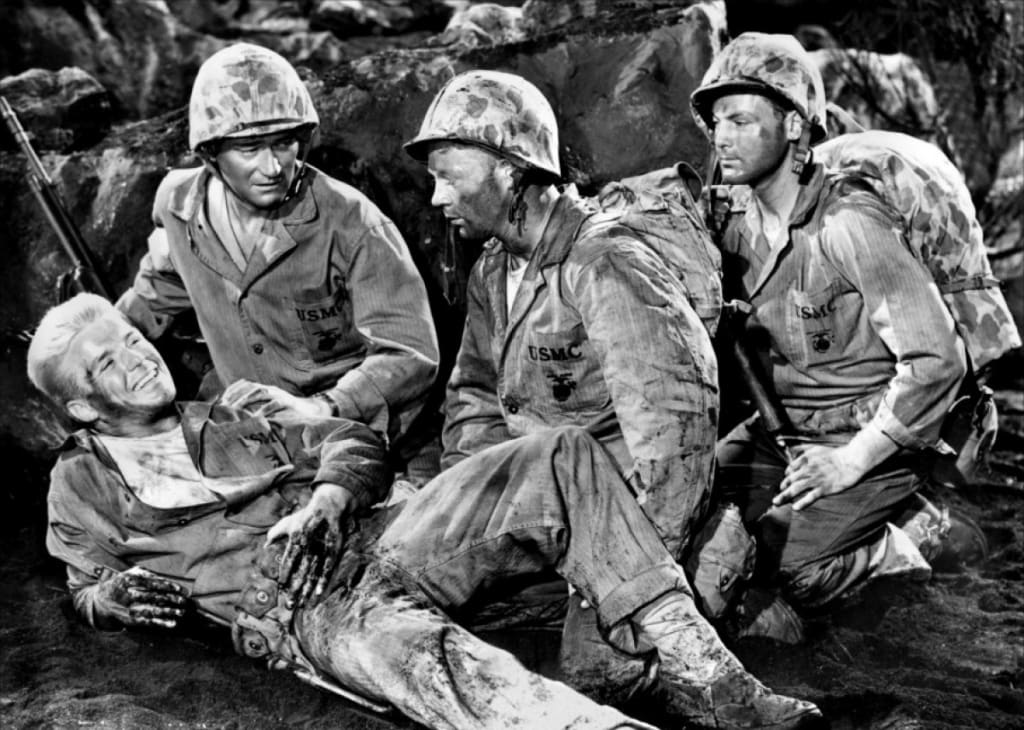Old School War Movies Every Recruit Needs to Watch
Headed off to boot camp, or simply thinking about the implications of your choice in signing up? Catch any of these old school war movies to gear up and build morale.

There's no shortage of good war movies, from the likes of the more well-known crowds like Saving Private Ryan and Letters from Iwo Jima, to more less frequented titles, such as The Hunt for Red October and Good Morning, Vietnam, there's a vast array of names to choose from when in the mood for some patriotic entertainment. Especially if you're a newly minted recruit, or even a longtime veteran, these following war films lend credence to the brotherly bond so attributed to the battlefields of old, and how this firm familiarity between soldiers seemingly outlasts the test of time. This is one of the many benefits of being an army recruiter, talking good old war stories to the youth, exhibiting the qualities of a natural born leader, and identifying with the quintessential essence of the warrior in your heart.
No mater the particular case, there are great many examples of military movies reaching beyond the fold and touching our hearts in interlocking emotions. And, while they are not always pretty images (if ever), there does seem to be a level of warmth attached to them, or at least a feeling of pure connection that not many other genres can boast. Maybe it's because we're watching a glimpse of history, or maybe it's because we feel so patriotically close to our long lost brethren; it's unclear. What is known, however, is that the following old school war movies will not only hype you up and prepare you for the next few years of your life, they'll also motivate and encourage you to aim for that very last remaining morsel of strength inside of you. Whenever you feel all hope is seemingly lost, think back to these various moments locked in history, wherein the darkness and horrors have been abated by men and women just like you long ago, and keep that deep inside of your heart.
This John Ford production brought to life the fictitious events at the Battle of the Philippines, looking at how Motor Torpedo Boat Squadron Three helped push back Japanese forces in an almost helpless situation. It's among old school war movies for the simple fact that John Wayne, yet again, takes up the helm of this 1945 rendition on historical occurrences.
The story, although based on the William L. White book, is also a subtle look at real life people, like Medal of Honor recipient John D. Bulkelay, who is portrayed by Robert Montgomery, and Robert Kelly, who's fictionalized as Wayne's Rusty Ryan. They Were Expendable takes a look at how certain occurrences believed to have happened in war could somehow becomes idealized by the entertainment world. To this day the movie is considered a form of verisimilitude, or the philosophical understanding between the relative and the apparent; simply put, truth and falsity in the face of theoretical acceptance.
Based on the novel of the same name by Stephen Crane, The Red Badge of Courage was an epic portrayal of the American Civil War. Brought to life by none other than Audie Murphy, a WWII veteran himself, in addition to a host of names like Bill Mauldin, Royal Dano, and Andy Devine, Courage was an ideal consideration of American fervor as best constituted under the bloody reimagining of freedom, and what this freedom had cost us in the face of one of the most violent American offensives.
Despite the fact that it has been praised in the many years following its release, the movie was meat with some mixed connotations. It's a sore subject when you look at it the way the original author, Stephen Crane, does. He essentially calls into question the nature of American greed and bloodlust, powerfully igniting the emotions of both past and even present, making this cherished title an instant addition among old school war movies.
Another one of those old school war movies starring the impeccable John Wayne, Sands of Iwo Jima tells the tale of World War II in a total dramatization meant to directly challenge the ideology of warfare and the aftermath of these events on the mind of soldiers everywhere. It's also a TMC must watch that never lets down the action and superior unknown that war itself belies, in addition to the variety of pop cultural innuendoes that still continue to be used; Sands of Iwo Jima is where the first known iteration of the phrase "lock and load" took root.
It will go down in history as among the most iconic, perplexing, and still motivational pieces of entertainment staged in the likeness of the WWII theater, in which a variety of evils took root. Wayne, as the all-too familiar Western actor and American hero of the 50s, yet again sails into the highly prominent role of John M. Stryker, a soldier who tends to ignore the likes of his companions and the necessity of boot camp, right up until the war comes to smack him into shape.
More of a comedic expression describing the veteran rather than a historical interpretation, Kelly's Heroes isn't your typical military film, but is reminiscent of the infamous and hilarious MASH. Starring the likes of Clint Eastwood, Donald Sutherland, and Don Rickles, Brian Hutton's 1970 war comedy involves the likes of a bunch of AWOL army soldiers who intend on robbing a bank behind enemy lines. It's not just a comical laugh riot meant to point jokes at the reserves or military, not in any sense, otherwise it wouldn't be among old school classic war movies.
Dropping the characters into the heart of WWII, Kelly's Heroes identifies with various themes and pokes fun at consistent storylines inherent in war filmography (doesn't this movie remind you of Three Kings?), and takes a more outlandish approach at portraying the war, or any war, as an unimportant waste of time meant to, in effect, rob the blind. Look at the very characters in this masterpiece, all of which embodying some form of the atypical soldier, from the "Oddball," played by Sutherland, to the "Cowboy," played by Jeff Morris. It's an atypical film adaption that can bring you laughs well after the credits have rolled.
Among old school war movies that should never be missed my fans of the military genre, To Hell and Back is one of the most realistically portrayals of militaristic action on screen, as it employs the very person it's about as the main actor. It's an autobiographical depiction of Audie Murphy's relentless experiences in the ravaged Italian theater during WWII.
Exceptionally embodying the officer and veteran of his past, Murphy brings to life this personal escape into the black abyss of one the most destructive wars in history. Historically speaking, Murphy also details his and his men's involvement in the Allied Operation Shingle, which was an Italian campaign that intended to delay German occupation by first designing an amphibious assault, which led into the Battle of Anzio, then culminated with the eventual capture of Rome in over five months of time. This is all discussed in great detail and brought to life in To Hell and Back.
Edward Ludwig directed this beautiful masterpiece of historical fiction that details the initialization of the US Navy's "Seabees" during the Second World War. Starring the legendary actor John Wayne, not to mention other greats like Dennis O'Keefe and Susan Hayward, The Fighting Seabees is one of the truest additions among old school war movies, mainly because it paints a relatively unobscured look at our military's most trying battle with the Japanese.
John Wayne plays a construction worker, Wedge Donovan, who works for the US Navy, while O'Keefe is Lieutenant Commander Robert Yarrow, Donovan's militaristic leader. The two butt heads seemingly at all angles, first beginning with Donovan's direct ignorance of command by leading an offensive attack on the Japanese, which destroys any attempt Yarrow had had in devising a more stealthy form of stratagem. Most identifying of its consideration among old school war movies is how the creation of the Construction Battalions (CBs, more often than not denoted as "Seabees") and how they were used to push back the Japanese offense.
In this 1957 classic anti-war film starring a young Kirk Douglas, one French commanding officer must see through the lines of his orders and decide on the best possible route when the soldiers under his authority deny being a part of a suicidal attack against the German enemies. Paths of Glory may very well be among the most awe-inspiring war films, despite the fact that it directly criticizes these archetypes and identifies the undervalued precepts that war itself has birthed.
In the movie, Douglas plays the hard tempered and intelligent Colonel Dax in the midst of an ongoing attack between his French forces and the Germans, wherein one of the most realistic scenes of shell shock is presented in the disturbed private played by Fred Bell. Himself left with the planning of the attack on the Anthill, Dax must not only wrangle up the morale of his own troops to ensure victory, but must overcome his own intermittent feelings in the inevitably of complete failure. It's a truly remarkable example among old school war movies that, in all accords, looks to deny war a virtuosic placeholder and intends, instead, to draw it as a deathbed of unruly aspects.
Based on one of many books recommended by the US military for aspiring soldiers, despite the fact that it's based on two Germans in the heart of World War I, All Quiet on the Western Front is a poignant image of the unfathomable bleak dimensions that war presents. It's not meant to be artistic, symbolic, or even political, like some of our more recent military movies, but it allowed us a small glimpse into one of the most daunting battlegrounds, under which presided a tyrannical rulership that cared nothing for the human lives of its war machine. It's not only among the best old school war movies, it's probably one of the most surreal depictions of the first world war ever enacted.
The story tells of Paul Baumger's life following his initiation into WWI following the constant barrage led on by his classmates and even school teacher. Encapsulating the life and times of the soldier, as an entity rather than a character, Baumger's dark trials on the Western Front, which is one of the main and bloodiest battlegrounds of the war, tell of only remorse, heartbreak, and decay. There's no happy ending, besides of course that long awaited silence, for which in of itself is the calm and peace that which the story correlates to the German patriotism enlivened in Baumger and his classmates, only to be sourly crushed as the story progresses.
Drawing into picturesque form the trials of the United States Army's Eighth Air Force, and based on the 1948 novel of the same name, Twelve O'Clock High seemingly captured how a few men in metal plated birds could, in essence, become the deciding storm of victory. Starring such well-known actors as Gregory Peck, Hugh Marlow, and Dean Jagger, the military movie was intended not only to show the historical background of the bombing raids these crewmen led through occupied France and Germany, but also of the deeply-felt hardships so inclined by even the Air Force pilots at the time.
It's based on true and actual events, though the characters are hence identified as specific veterans through which have undergone somewhat fictitious aversions. Peck plays Brigadier General Frank Savage, who is more or less considered as being the commander of the 306th Bomb Group, Colonel Frank A. Armstrong. As you can see, a great deal of historical background and real world considerations were put into the making of an instant classic among old school war movies.
Self identifying, Air Force obviously tells the story of air crewmen in piloting a Boeing B-17 Flying Fortress across the Pacific, wherein they find tragedy upon discovery of the attack on Pearl Harbor. While they were intended to fly for Hickam Field Airbase, the crew, though piloting an unarmed heavy bomber, decide instead to be the harbor's only form of saving grace, if even that were possible.
What makes Air Force one of the most historical old school war movies is the fact that it preceded the actual events of Pearl Harbor in 1941 and was considered a direct form of military propaganda amid the Second World War. This was the world's first detailed example of formulating a basis of militaristic opposition through the arts and entertainment. Interestingly, the movie also boasts a small uncredited section written by William Faulkner himself. You honestly can't get more WWII than that.
Jean Renoir's 1937 French war film was a literal, grand look at the variety of mindsets and cultural denominations upheld by a group of POWs held within a German occupied castle. Each of the prisoners share in a somewhat similar idealism, though they are all very conceptually different, varying in class, background, and overall religious idealism. The title is actually borrowed from a British book, The Great Illusion, which theorized the connotations of war under a strict view that it tended to amount to nothing but bolstering economics and more specific European families, which all obviously become prominent themes in Renoir's classic.
One of the main characters, Lieutenant Maréchal, who's played by the masterful Jean Gabin, is identified as being a working-class individual with a modest social ideology, whereas his new friend and confidant among the POW camp, Lieutenant Rosenthal, is a high-brow and wealthy Jewish Frenchman. Seeing these two, alone, interact with one another in various settings, while also undergoing critical examinations of the entire war, is all breathtaking to watch. Not to mention the fact that Orson Welles admitted this was one of his favorite films, Grand Illusion is as iconic and as thought provoking as old school war movies come, and quite possibly may never be outwitted.
About the Creator
Salvador Lorenz
Thinking in nodes of progress, futurism, science, culture, and existence. I experience life in a number of ways, pertaining to mathematical concepts mixed with rich flavors of art.






Comments
There are no comments for this story
Be the first to respond and start the conversation.